Updated Research Policy Emphasizes Field-based Learning and Innovation
 Research is a critical part of USAID’s policies and strategies. It allows USAID to develop, test, refine and evaluate the acceptability and cost-effectiveness of new and improved products, tools, approaches, and interventions for development. The Agency has a strong history of investing in research to support its programs, including its relationship with the National Academy of Sciences and various U.S.-based universities, the formation of Collaborative Research Support Programs (CRSPs), which focus the capabilities of U.S. land grant universities to carry out the international food and agricultural research, and participation in CGIAR, a global partnership that unites organizations engaged in research for a food secure future.
Research is a critical part of USAID’s policies and strategies. It allows USAID to develop, test, refine and evaluate the acceptability and cost-effectiveness of new and improved products, tools, approaches, and interventions for development. The Agency has a strong history of investing in research to support its programs, including its relationship with the National Academy of Sciences and various U.S.-based universities, the formation of Collaborative Research Support Programs (CRSPs), which focus the capabilities of U.S. land grant universities to carry out the international food and agricultural research, and participation in CGIAR, a global partnership that unites organizations engaged in research for a food secure future.
In an effort to consolidate USAID’s operational policies related to research and to bring them up to date, the Agency launched its Scientific Research Policy on January 14 at an event in Washington, DC. Speakers included Ann Mei Chang, Executive Director of the U.S. Global Development Lab at USAID; Dr. Rob Bertram, Chief Scientist at the USAID Bureau for Food Security; Dr. Richard Bissell, Executive Director of Policy and Global Affairs at the National Academy of Sciences; Dr. Nina Dudnik, Founder and Chief Executive Officer of Seeding Labs; and Dr. Naji Khoury, PEER Awardee and Assistant Professor of Civil Engineering at the Notre Dame University-Louaize in Lebanon.
Major themes discussed around the policy update had strong connections to strengthening a culture of learning at USAID. Speakers emphasized the need to strengthen the capacity of local scientists in country, not only to promote local ownership of research findings but to also better ensure those findings are translated into recommendations to policymakers and results for beneficiaries.
Partnerships
Multilateral partnerships will help USAID to generate knowledge applicable to local contexts but that can also be scaled to a regional level. Dr. Bissell from the National Academy of Sciences noted the recent completion of a 10-year effort by the Academy to build and support science academies in other countries for the purposes of creating more links between local researchers and their governments. As a result of the collaboration, more than 15 new academies have been formed with significant progress made in Uganda and Ethiopia.
Dr. Dudnik discussed the work of her organization, Seeding Labs, which provides reclaimed laboratory equipment, training, and other collaborative opportunities to researchers and students in developing countries. As a result, scientists are able to conduct research where it’s most relevant, leverage relationships with the local community, and train the next generation of researchers. In this way, Dr. Dudnik described her work not as “research for development,” but rather “research as development.”
Communities of Practice
The speakers noted a common challenge in working with scientists from developing countries—frequently, those trained in the U.S. are not interested in returning to their home countries. The reasons are understandable: they have a harder time securing funding; the connections to the larger research community are weaker; and their findings often gain less traction in the policy arena. To combat some of these challenges, speakers encouraged the development and support of locally-based communities of practice for researchers. The ability to tap a network for support and to share knowledge with that network could encourage more researchers to return to their home countries.
Field-level Learning and Innovation
Dr. Khoury shared his experience as a Partnerships for Enhanced Engagement in Research (PEER) awardee. The USAID-funded program, managed by the National Academies, awards grants to researchers in eligible developing countries to engage in a collaborative research project with a U.S. Government (USG)-supported researcher, who provides complementary expertise and skills. Dr. Khoury’s project studies earth dams in Lebanon. The program includes plans for recruiting and mentoring high school and undergraduate students, particularly women and persons with disabilities, to help them gain experience in engineering research; developing a program to introduce high school students and persons with disabilities to sustainable practices in civil engineering; and organizing workshops on sustainable engineering for use in high schools and public forums. Ultimately, the project hopes to enable participants to contribute to economic growth and to advocate for policy changes regarding dam construction and maintenance. The anecdotes above illustrate the potential of research initiatives to generate field-based learning and enable a greater network of learning and knowledge sharing among those who can make the greatest impact.
Read the entire Scientific Research Policy for specifics on operational standards and procedures.



